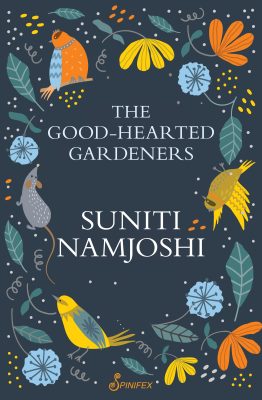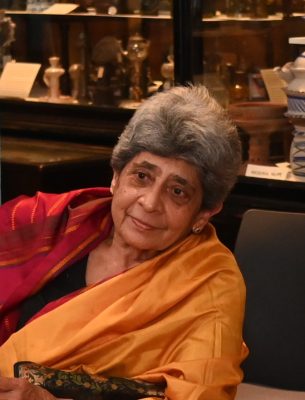Click here to return to the world eco-fiction series
About the Book

I enjoyed reading this witty novella set in lively gardens with speaking animals, two lovers discovering each other and how language envelops their world, and the whims of other gardeners and intermittent poetry, all beneath sunny London skies.
The Good-Hearted Gardeners is a comedic allegory for our future.
What do you do when you fall in love with your next-door neighbour? You peer at each other through a hole in the fence and eventually climb over. Sybil is a member of The Good-Hearted Gardeners, a Society for Well-Meaning Efforts for the Betterment of Language and the Salvation of the Planet, which her lover, Demo, is allowed to join. It’s funded by MI5, who ask them to monetise and weaponise the English language. Soon afterwards, they discover that English is even more widespread than anyone had thought. Even the birds and the fish, the cows and the kangaroos can speak it, when they choose. The Good-Hearted Gardeners set about trying to talk to anyone—crows, magpies, robins, goldfish, cows, horses, rats, mice—who will talk to them.
With climate change and technology gone mad, what’s in store is a frightening scenario that threatens everyone—humans, animals, plants. Can the headlong rush to extinction be halted? When the birds, and the cows and the horses and the mice and all the rest come together, much is made possible. But at what cost? Will the planet and its inhabitants be saved?
Chat with the Author
Mary: I’ve read about your background—growing up in India, teaching at the University of Toronto, and writing fiction and poetry. It sounds fascinating. What are some of your favorite memories from your earlier years?
Suniti: No one has asked me that before. Here are a couple of memories:
My father was a pilot. Once he took me up in a small trainer plane. I wanted to go through the clouds. That was possible. Then I wanted to go to the moon. That wasn’t possible—not then, not in a tiny aircraft. Children don’t know the difference between the possible and the impossible. And as adults we don’t know if we can stop ourselves from rocketing towards self-destruction.
I was a junior officer in the Indian Administrative Service when one of the women clerks asked me to intercede with the bosses for a women’s loo. It was hard on the women to work all day long without a loo. I should have asked, should have tried. Too awkward. I didn’t. I have kicked myself for it ever since.
Here error is all in the not done,
all in the diffidence that faltered. . .
-Ezra Pound, Canto LXXXI
Mary: Your novel The Good-Hearted Gardeners (Spinifex Press, 2023) is described as a comedic allegory for our future. The story seems fascinating, with perhaps the best group name I’ve ever heard: The Good-Hearted Gardeners, a Society for Well-Meaning Efforts for the Betterment of Language and the Salvation of the Planet. What inspired you to write this novel?
Suniti: What started it was thinking about language: its limitations and power to express one’s thoughts, to communicate and to silence others—by not letting them speak, by demeaning their speech, by making one kind of speech supreme over all others. I had a lot of fun with the Good-Hearted Gardeners being told to monetise and weaponize English, and then discovering that the birds and beasts could actually understand and speak English, when they chose to. It’s our sense that we are at the centre of the universe and that nobody else matters, which has made us so destructive. We are only one species among many. My partner, Gillian Hanscombe, once wrote a poem, which she can’t find now, about what would happen if the birds could speak, if the snake could speak—perhaps that was the real inspiration. (They do speak. We don’t listen or understand.)
Mary: What kinds of conversations do the animals have, and what do they teach the gardeners?
Suniti: The animals tell them to grow up and do something. For example, here’s part of Madame Emma, the barn owl’s plan.
Stage One: Passive Resistance
Pigs to go on hunger strike.
Horses to refuse to race, cats to stop purring, and dogs to consistently disobey orders.
Sheep and goats to wander where they like.
Sometimes the animals just put them in their place.
While Sybil is mopping up her coffee, I ask Crow, “Venerable Sir, do we figure at all in your stories and poems?”
He blinks and appears slightly embarrassed. “You do figure now and then, but only as giants and ogres and fiends from hell whom heroic crows contrive to kill or dupe somehow.” He shrugs. “No offence. It’s just how it is. And you don’t have to be so damn polite. I’m just an ordinary creature—like you.”
“We thought—,” Sybil begins lamely.
“You thought now that you’ve discovered our creature-hood, you ought to treat us with the utmost respect, put us on a pedestal and venerate us. The point is not that we are particularly meritorious; the point is that we are. Stop kowtowing. We don’t want to become extinct along with you. Let’s do our best to work together and prevent that if we possibly can.”
Mary: It’s also a love story between Sybil and Demo. How did you create and build these characters?
Suniti: I’m more of a fabulist and a satirist than a novelist, and so the characters can often be silly or ridiculous. To reduce the harshness, their follies are often based on my own.
Mary: The story is ultimately about trying to halt extinction. That’s so important in our world, and one of the ways we can do that is to build hope for readers in our storytelling. What are your thoughts on that, and what other books have you written that do something similar. That empower readers?
Suniti: To halt extinction we’ll have to change the way we think. Sometimes I despair, but here’s a poem from The Good-Hearted Gardeners, which suggests something is possible.
IN A WORKING PARADISE
There may be a place
where bees go about
tending cells, collecting pollen,
stashing honey;
while in the wide world
nothing bad happens.
It’s just another
summer’s day.
Don’t bees die?
Do the seasons not change?
Does the lion snuggle up
to the woolly lamb?
And then does the lion
eat the lamb?
Or does the stupid lion starve to death?
Bees die, some carry on
to a reasonable age.
In a working paradise, even lions
are allowed to live,
but there is no war
and no one is exploited.
My children’s book The Antarctic Mission in the Aditi Series is published by Tulika Books, Chennai, and there’s Aesop the Fox (Spinifex Press, 2018 and Delhi: Zubaan, 2018), in which the narrator goes back in time and badgers Aesop about saving the world. She says to him, “Isn’t that the function of writers?” In my short story “Bad People” in Dangerous Pursuits, three siblings, who are the villains of the Indian epic, The Ramayan, devote themselves to doing something about global warming. (They’re not so villainous, after all.)
Mary: I love that idea that the functions of writers is to save the world. Thank you so much, Suniti, for talking with me and sharing your prose and thoughts about your novels.
About the Author
Internationally acclaimed author Suniti Namjoshi is an important figure in contemporary literature in English. A writer of fables, poetry, satirical fiction, and children’s fiction, she has published over 30 titles in India, Australia, Canada, and Britain. Born in Mumbai in 1941, she first wrote and published in India, moved to Canada, and then to a small seaside village in the south-west of England with writer, Gillian Hanscombe. In 2023, she was elected a Fellow of the Royal Society of Literature. Her books include Feminist Fables, Goja, Suki, Aesop the Fox, and Blue and Other Stories from Spinifex.
